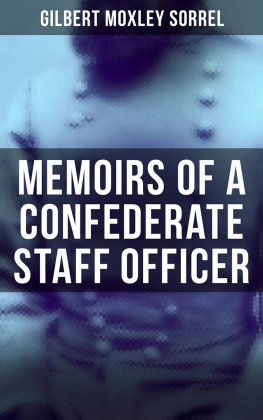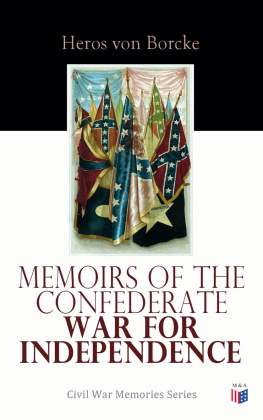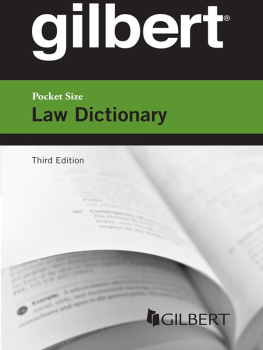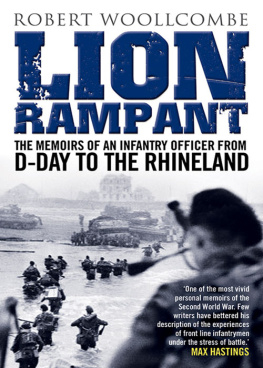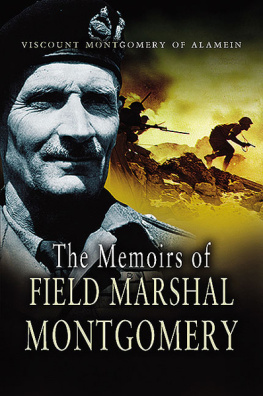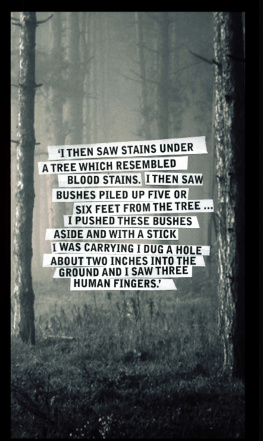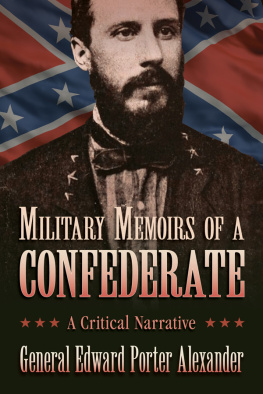Introduction
A few months ago I entered a room where a group of five or six gentlemen were seated around a table in conversation. As I took my seat to join them, one of the number, a distinguished Northern Senator, of high cultivation and who is a great reader of history, made this remark to his companions: "The Army of Northern Virginia was in my opinion the strongest body of men of equal numbers that ever stood together upon the earth." As an ex-Confederate soldier I could not feel otherwise than pleased to hear such an observation from a gentleman of the North who was a student of military history. As the conversation continued there seemed to be a general concurrence in the opinion he stated, and I doubt if any man of intelligence who would give sedate consideration to the subject, would express a different sentiment.
The Army of the Potomac, the valiant and powerful antagonist of the Army of Northern Virginia, was indeed of much larger numbers, and better equipped and fed; but it would have nevertheless failed but for its high quality of soldiership which are by none more respected than by its former foes. Both armies were worthy of any steel that was ever forged for the business of war, and when General Grant in his "Memoirs" describes the meeting after the surrender of the officers of both sides around the McLean House, he says that they seemed to "enjoy the meeting as much as though they had been friends separated for a long time while fighting battles under the same flag." He prophesied in his last illness that "we are on the eve of a new era when there is to be great harmony between the Federal and Confederate."
That era came to meridian when the Federal Government magnanimously returned to the States of the South the captured battle-flags of their regiments. The story of the war will be told no longer at soldiers' camp-fires with the feelings of bygone years, or with even stifled reproach, but solely with a design to cultivate friendship and to unfold the truth as to one of the most stupendous conflicts of arms that ever evoked the heroism of the human race.
"Recollections of a Confederate Staff Officer," by Brigadier-General G. Moxley Sorrel, of the Army of Northern Virginia, is a valuable contribution to this great history. Its author received his "baptism of fire" in the First Battle of Manassas, July 21, 1861, while serving on the staff of Brigadier-General James Longstreet as a volunteer aid, with the complimentary rank of captain.
The forces under General Beauregard at Bull Run were known at that time as "The Army of the Potomac." The name of the antagonist of the Federal "Army of the Potomac" was soon changed to the "Army of Northern Virginia"; and Longstreet, the senior brigadier, became major-general and then lieutenant-general.
Sorrel followed the fortunes of his chief, serving as adjutant-general of his brigade, division, and corps, with rank successively as captain, major, and lieutenant-colonel, and distinguished himself many times by his gallantry and efficiency. During the siege of Petersburg the tardy promotion which he had long deserved and for which he had been time and again recommended, came to him and he succeeded Brigadier-General Girardey, a gallant soldier, who had been killed in battle, as commander of a brigade in Mahone's division, A. P. Hill's Third Corps.
When promoted he showed the right spirit by making a faithful and brave courier his aide-de-camp. As a general, as well as while on the staff, Sorrel often had his "place near the flashing of the guns." At Sharpsburg he leaped from his horse, with Fairfax, Goree, Manning, and Walton, of Longstreet's staff, to serve as cannoneers at the guns of the Washington Artillery, whose soldiers had been struck down. While he was carrying a message to a brigade commander his horse was shot under him, and still later on the same field a fragment of a shell struck him senseless and he was for a while disabled. He passed through the maelstrom of Gettysburg, here and there upon that field of blood; the hind legs of his horse were swept away by a cannon ball, and at the same time he and Latrobe, of Longstreet's staff, were carrying in their arms saddles taken from horses slain under them.
At the Wilderness, May 6, 1864, he was at the side of his chief when that officer was badly wounded, and when General Jenkins, of South Carolina, and Captain Dobie of the staff were killed. He won his general's wreath that day, although it was some time before it reached him. At the crisis when Longstreet's corps was going to the rescue he was entrusted with marshalling three brigades to flank the advancing forces of General Hancock. Moving forward with the line of the Twelfth Virginia Infantry, of Mahone's brigade, he endeavored to take its colors as it advanced to the onset, but Ben May, the stout-hearted standard-bearer, refused him that honor and himself carried them to victory. When this battle was over General Lee saluted him as "General Sorrel."
He was wounded in the leg while commanding his brigade on the right of the Confederate line near Petersburg; and again he was shot in the lungs at Hatcher's Run in January, 1865, the same action in which fell the brave General John Pegram, then commanding Early's old division.
During the illness resulting from this wound, General Sorrel was cared for by relatives in Roanoke County, Virginia, and having recovered sufficiently returned to the field. He was in Lynchburg, Virginia, on his way back to his command when the surrender at Appomattox ended the career of the Army of Northern Virginia.
Scarcely any figure in that army was more familiar to its soldiers than that of General Sorrel, and certainly none more so to the soldiers of the First Corps. Tall, slender, and graceful, with a keen dark eye, a trim military figure, and an engaging countenance, he was a dashing and fearless rider, and he attracted attention in march and battle by his constant devotion to his duties as adjutant-general, and became as well known as any of the commanders.
General Sorrel has not attempted a military history. He has simply related the things he saw and of which he was a part. He says of his writings, "that they are rough jottings from memory without access to any data or books of reference and with little attempt at sequence." What his book will therefore lack in the precision and detail as to military strategy or movement, will be compensated for by the naturalness and freshness which are found in the free, picturesque, and salient character of his work.
General Sorrel was of French descent on his father's side. His grandfather, Antoine Sorrel Des Riviere, had been a colonel of engineers in the French Army, and afterwards held estates in San Domingo, from which he was driven by the insurrection of the negroes in the early part of the nineteenth century. He then moved to Louisiana.
His father, Francis Sorrel, became a successful business man in Savannah, Georgia, and his mother was a lady of Virginia. If he inherited from one those distinctively American qualities which were so attractive in his character, we can but fancy that he inherited in some degree at least from his sire the delicate touch with the pen which is so characteristic of the French. They have written more entertaining memoirs than any other people, and this memoir of General Sorrel is full of sketches, incidents, anecdotes, and of vivid portraitures and scenes which remind the reader no little of the military literature of the French.
No military writer has yet undertaken to produce a complete history of either the Army of the Potomac or the Army of Northern Virginia. Indeed, it has scarce been practicable to write such a history. The rolls of the two armies have not yet been published, and while the War Records have furnished a great body of most valuable matter and there are many volumes of biography and autobiography which shed light on campaigns and battles, the deposit of historical material will not be finished before the whole generation who fought the war has passed from earth. This volume will be useful to the historian in giving him an insight to the very image and body of the times. It will carry him to the general's headquarters and from there to the picket-line; from the kitchen camp-fire and baking-oven to the hospital and ordnance wagon; from the devices of the commissary and quarter-master to the trenches in the battlefield; from the long march to the marshalled battle line; from the anxieties of the rear-guard of the retreat to the stern array of the charging columns. He will find some graphic accounts of leading characters, such as Longstreet, Ewell, D. H. Hill, A. P. Hill, Jeb Stuart, Early, Anderson, Mahone, Van Dorn, Polk, Bragg, and many others who shone in the lists of the great tourney. The private soldier is justly recognized, and appears in his true light all along the line, of which he was the enduring figure. Lee, great and incomparable, shines as he always does, in the endearing majesty of his matchless character and genius.

